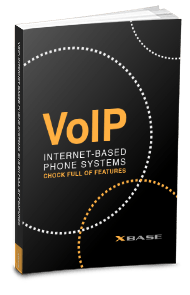Voice over Internet Protocol (VoIP) is a reliable and cost-effective communications solution that can help small- and medium-sized businesses (SMBs) keep in touch with vendors, customers, and other stakeholders. Unlike traditional telephony systems that require expensive infrastructure and equipment, VoIP can run on existing IT assets, making it perfect for SMBs with limited budgets.
But while VoIP brings a suite of benefits, it is not without risks. VoIP systems are internet-powered, which means that they are not immune to internet-based attacks. Here are some risks you should be prepared for if you are using or plan to use VoIP in your operations.
Denial-of-service attacks
A denial-of-service (DoS) attack overloads and cripples your communications systems so they’re rendered unusable. There are many reasons why a cybercriminal may want to launch a DoS attack at your VoIP systems; for instance, they may want to ensure that you can’t ask for help while they’re steadily gaining access to your networks. Some attackers may also hope to extort ransom from your organization in exchange for letting you regain control over your systems.
To protect your VoIP systems from DoS attacks, you should implement the following safeguards:
- Separate voice and data traffic. Doing so ensures that there’s plenty of bandwidth available, minimizing the chances of DoS attacks such as call flooding and spam over internet telephony (SPIT) from succeeding. Separating your traffic also makes it easier to isolate attacks and ensure that other systems are not affected even if one system gets compromised.
- Use encryption and virtual private networks (VPNs) as part of your authentication process. You may be tempted to source cheap — or free — encryption and VPN solutions, but note that these are often unsecure. Partnering with a managed IT services provider like XBASE Technologies gives you access to industry-grade solutions for a flat monthly fee.
- Enforce technical considerations such as activating only servers that are necessary to support VoIP, restricting VoIP server access to administrators, and regularly monitoring server access.
Viruses and malware
Just like any internet application, your VoIP system is exposed to a plethora of malware, Trojans, and viruses. These cyberthreats can cause unwanted system interruptions, steal valuable information, access protected data, or take over your entire computer system.
This is why it’s critical to install antivirus software to keep these threats at bay. Also, updating software patches as soon as these become available also helps keep your VoIP safe, as these updates often contain bug fixes or enhanced security features. Keeping mobile software and hardware up to date is also nonnegotiable, since many users use their mobile devices to make VoIP calls.
Social engineering attacks
By using various social engineering schemes, cybercriminals can trick unwitting employees into giving out their VoIP login credentials or installing malware onto the VoIP system. One such scheme is vishing, or the voice message-based version of email phishing.
Vishers will gain their target’s trust by posing as an authentic entity such as a bank personnel or a security expert. Often, they will inform the potential victim of an alarming (albeit false) scenario that forces the latter to divulge critical information. For instance, a visher may say that the victim’s bank account has been locked and the only way to make it accessible again is by confirming some bank account information.
The best way to mitigate social engineering attacks is to have your staff undergo a security awareness training program. This will enable your workforce to identify the signs of phishing attacks and how to report such incidents. What’s more, you should restrict your VPN connections, avoid unknown callers, and examine access logs regularly.
Eavesdropping
Eavesdropping happens when a hacker gains access to and listens in on VoIP calls, allowing them to hear all sorts of sensitive business information and trade secrets. A hacker usually eavesdrops to obtain login credentials and other details that will allow them to gain more network access. Eavesdropping can be done remotely, which means any hacker in the world can infiltrate your systems and be privy to your VoIP calls.
To prevent hackers from eavesdropping on your VoIP conversations, you should:
- Change the default configurations of your VoIP system as soon as you can. Lists of default VoIP credentials are readily available online, and hackers can use this data to get into your systems.
- Set up gateway security that will serve as your first line of defense against eavesdroppers. Consider installing intrusion detection and prevention systems as well, so your IT admin can monitor and filter unauthorized VoIP traffic.
- Implement session border controllers (SBCs) and make sure that they’re always up to date. SBCs serve as VoIP firewalls, which allow authorized sessions to pass through while blocking incoming threats.
- Enforce strong encryption on your VoIP systems. This will prevent hackers from unscrambling and understanding calls over VoIP even if they are able to get their hands on your data packets.
XBASE Technologies offers Exponentially Better™ and secure VoIP services to SMBs in Ontario. Learn more about VoIP and how it can benefit your business by downloading our FREE eBook on VoIP today.
Should your business switch to Voice-over-Internet phones?
Your questions about VoIP, answered by technology experts through this eBook: VoIP: Internet-based phone systems chock full of features.

